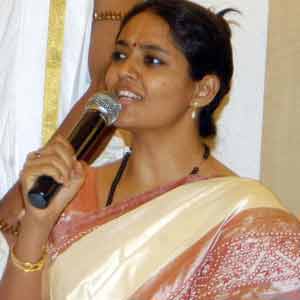
The actress was among 70 devotees, including a few foreign nationals, who received the deekshe. Ranjitha was clad in a saffron dress and chanted mantras (prayers) before being administered the sacred vow, sources in the ashram said. She has now assumed the name Maa Anandamayi.
Over a hundred devotees from Andhra Pradesh, Kerala and Tamil Nadu attended the event. Religious rituals started at 6 am and went on till 9 pm. A few hoardings of Nithyananda were installed on the premises and Kannada and Tamil film songs were sung during a procession preceding the deeksha ceremony.
Entry for visitors was restricted and four policemen were guarding the premises. The ashram residents themselves had made the security arrangements and closed the main door. Tension prevailed for a while when a handful of cameramen climbed the compound of the ashram and started shooting the proceedings. The ashramites allegedly threw stones at them and berated them for the intrusion.
A few Kannada organisations held protests outside the ashram and demanded that Nithyananda be exiled from the State. They tore down banners and hoardings and set tyres on fire, shouting anti-Nithyananda slogans and performed a mock funeral procession.




Comments
After I initially left a commentt I seem to have clicked on the -Notify me when new comments are
added- cueckbox annd now every time a comment is added I recieve 4 emails with the same
comment. There has to be an easy method you can remove me
from that service? Thanks a lot!
Also visit my website; commercial cleaning equipment: http://ge.tt/3LE0GgR2/v/0
Add new comment